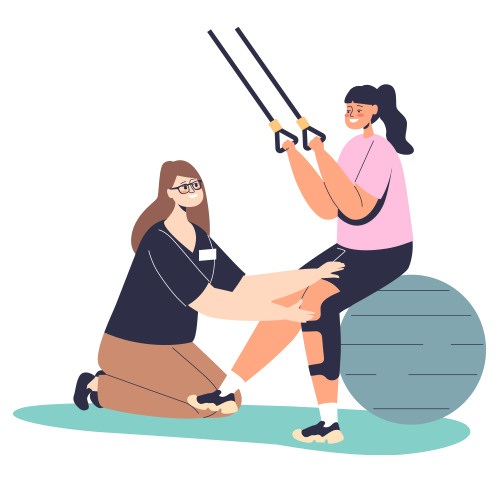
Conquering Neck Pain & Headaches: A Tale of Two Journeys
Meet Sarah and John, two individuals living with persistent neck pain and debilitating headaches. Their paths to relief would prove to be markedly different.
Sarah’s Struggle with Neck Pain and Headaches
Sarah, a dedicated marketing manager, had always been an overachiever. Her job often demanded long hours hunched over a computer, fine-tuning marketing strategies, and meeting deadlines. The stress of her high-pressure job seemed to manifest physically as she began experiencing persistent neck pain and frequent headaches.
At first, Sarah chalked it up to stress and the demands of her work. She relied on over-the-counter pain relievers to alleviate the discomfort. These pills provided a semblance of relief, and she was grateful for the brief respite they offered.
However, as the weeks turned into months, Sarah noticed the pain progressing. What was once manageable headaches had evolved into searing pain that left her incapacitated.
Neck pain became a constant companion, interfering not only with her work but also with her ability to enjoy the things she loved most in her life.
Sleepless nights became the norm, and the pain began to affect her overall well-being. Simple tasks like turning her head to check traffic while driving or enjoying dinner with friends became excruciating endeavors. Sarah realized that the medication she had relied on was no longer effective, and her life was spiraling out of control.
John’s Journey to Recovery
On the other hand, John, a software engineer, faced a similar battle with neck pain and headaches. Like Sarah, his job required long hours in front of a computer screen. Initially, John also turned to over-the-counter pain relievers to manage the discomfort.
Unlike Sarah, John recognized that temporary relief wasn’t enough. He knew he needed a more comprehensive solution to address the root cause of his pain. After researching, he decided to seek help from Kinect Physiotherapy.
John’s physical therapist thoroughly evaluated his posture, range of motion, and muscle strength at his first appointment. They discussed his work habits and daily activities to identify potential triggers for his pain. It became apparent that his neck pain and headaches were closely tied to poor ergonomics at work and muscle imbalances in his neck and upper back.
With this understanding, John’s physical therapist designed a personalized treatment plan that included:
- Manual Therapy: John’s physical therapist performed manual techniques to release tension in his neck and upper back muscles. This provided immediate relief and improved his range of motion.
- Targeted Stretches: The therapist taught John stretches to help relieve muscle tension and improve mobility in the neck joints and upper back muscles to help reduce the frequency and intensity of neck pain and headaches.
- Postural Correction: John learned exercises to improve his posture and strengthen his neck and upper back muscles. These exercises helped him maintain better positions during long hours at the computer.
- Ergonomic Education: John received guidance on optimizing his workspace ergonomics, including raising his computer monitor to eye level and using an ergonomic chair at his desk. The small changes made a significant difference.

The Contrasting Outcomes
As John diligently followed his physical therapy plan, he began to experience positive changes. The frequency and intensity of his headaches diminished, and his neck pain significantly subsided. With his newfound knowledge of ergonomics and posture, he felt more in control of his health.
Sarah, on the other hand, continued to rely on over-the-counter medication in a futile attempt to manage her pain. Her condition worsened, and the once manageable headaches evolved into debilitating migraines. Sleepless nights persisted, and her daily life became increasingly limited.
It wasn’t until Sarah saw John’s transformation that she decided to take action. She sought the guidance of one of our physical therapists, just as John had done months earlier. Through a comprehensive evaluation and a tailored treatment plan, Sarah began her journey to recovery.

A Lesson Learned: Seek Comprehensive Care at Kinect Physiotherapy
While temporary relief from over-the-counter medication may offer initial respite, addressing the root cause of the problem is essential for lasting improvement. Our physical therapists will guide you toward a life free from chronic pain and headaches by addressing posture, ergonomics, and muscle imbalances.
It’s never too late to seek the path to recovery and regain control of your life!
Say Goodbye to Pain – Get Started with PT Now!
Ready to feel your best again? Come back to Kinect Physiotherapy and let us help you achieve your wellness goals—book your appointment today!

Valentine’s Day Word Scramble
oohsteccla
oohsteccla
ncyda
ebyrrafu
Answer Key
chocolates
flowers
candy
February


What to Do After Physical Therapy Ends
Completing a course in physical therapy is a significant achievement, but it’s essential to continue caring for your body even after your formal sessions end. Here’s a roadmap for what to do when physical therapy concludes, applicable to any patient:
Maintain Your Home Program: Continue with the exercises and stretches prescribed by your physical therapist as part of your home program. Consistency is key to sustaining the progress you’ve made.
Listen to Your Body: Pay close attention to any signs of discomfort or new symptoms. If something doesn’t feel right or if a familiar issue resurfaces, don’t ignore it. It’s a sign to take action.
Don’t Wait for Problems to Get Worse: Proactive care is essential. If you notice even minor discomfort or changes in your condition, contact Kinect Physiotherapy right away. Addressing issues while they’re small typically leads to quicker and more straightforward solutions.
Your physical therapist is just a call away. If your home program isn’t providing the desired results or if you’re facing a new challenge, consider returning to Kinect Physiotherapy for help. Addressing issues promptly often leads to quicker resolution.
Post PT Routines: Stay Ahead of the Curve
Your journey to better health doesn’t end when physical therapy concludes; it merely enters a new phase. By staying committed to your home program, actively monitoring your body, and seeking help when necessary, you can continue to thrive and enjoy a life free from pain and limitations.
Patient Success

“I am very pleased with the treatment I received at Kinect! I made quick progress thanks to Addy’s expertise and ability to tailor exercises to my needs. My quality of life has improved greatly & I would highly recommend Addy & Kinect Physiotherapy!”
-Phyllis F.
Seasonal Recipe
Easy Valentine’s Day Champagne Cupcakes
- Cooking spray
- 1 (18.25 oz) white cake mix
- 1 1/4 cups Champagne/sparkling white wine at room temperature
- 1/3 cup vegetable oil
- 3 eggs
- 1/2 cup butter, softened
- 4 cups confectioners’ sugar
- 1/4 cup Champagne or other sparkling white wine at room temperature
Directions:
Preheat oven to 350 degrees F (175 degrees C). Spray 24 muffin cups with cooking spray. Mix cake mix and 1 1/4 cup Champagne in a large mixing bowl; stir in vegetable oil and eggs. Beat batter with an electric mixer on medium speed for 2 minutes. Pour batter into the prepared muffin cups, filling them 3/4 full. Bake cupcakes in the preheated oven until a toothpick inserted into the middle of a cupcake comes out clean, about 20 minutes. Cool cupcakes in pans for 10 minutes before removing to finish cooling, about 30 more minutes. Mix butter, 1 cup confectioners’ sugar, 1/4 cup Champagne, and vanilla extract in a bowl. Stir in remaining confectioners’ sugar, 1 cup at a time, until frosting is smooth and creamy. Spread on cooled cupcakes.
Thank You for Subscribing to Kinect Physiotherapy
Staff Spotlight: Justin Mitchell, Physical Therapist
Justin graduated from West Virginia University with a BS in Exercise Physiology with an emphasis in aquatic therapy in 2013, followed by his Doctor of Physical Therapy in 2017. Justin began his career working in Denver, NC at a private practice Orthopedic and Sports clinic before joining Wake Forest Physical Therapy in 2019. He has experience treating orthopedic/musculoskeletal pathologies as well as neurologic, vestibular, and chronic pain issues. He is a native of West Virginia and in his free time enjoys cycling, soccer, snowboarding, and spending time outdoors.

Refer a Friend

Our purpose at Kinect Physiotherapy is to leave a greater impact on the community around us. In order to achieve our goal we want to change as many lives as possible as we become a beacon of positivity in our community.

Share Your Success Story
Love your experience with Kinect Physio? Click the button to leave us a Google review—your feedback helps others find the care they need!















